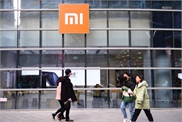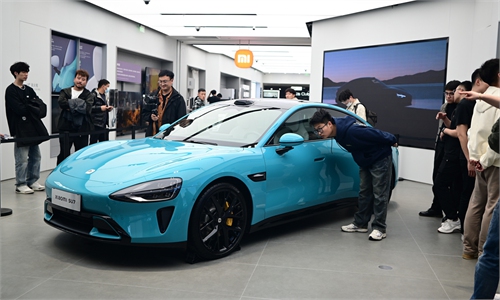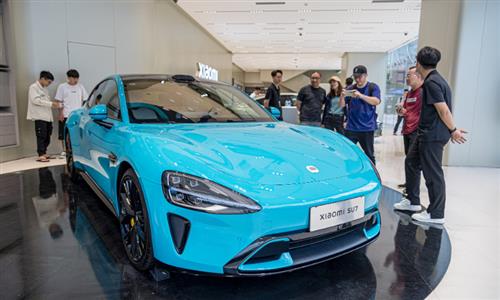
Illustration: Chen Xia/Global Times
Chinese consumer electronics giant Xiaomi held its second round of online orders for its first electric vehicle (EV), the SU7, which quickly sold out just like the first round did after its debut on Thursday.Many other EV brands have experienced an increase in sales over the weekend, Xiaomi CEO Lei Jun posted on Weibo on Sunday, which shows the wide range of market opportunities that come with China's EV boom. This trend deserves attention from Western countries that have failed to rationally view the rapid development of China's EV industry and are leaning toward protectionism.
These hot EV sales have drawn significant attention from Western media outlets, which exaggerate the threat of competition from the Xiaomi EV. They've evidently put their focus on the wrong things.
Some foreign media commentators have claimed that the hot sales of Xiaomi's EV are not a good sign for Western car manufacturers. They are keen on comparing Xiaomi with Porsche and Tesla. The cost-effective Xiaomi EV has indeed put pressure on competitors.
However, exaggerating the competitive pressure and demonizing Chinese products clearly distorts the facts and is extremely misleading.
It is precisely this kind of distorted thinking that has led Western countries to irrationally view China's rapidly developing EV sector with a sense of anxiety. They have taken protectionist measures against the competition it brings, while also trying to label Chinese products with unfounded accusations of "accepting subsidies" and "dumping."
For instance, US Treasury Secretary Janet Yellen on Wednesday claimed that China is treating the global economy as a dumping ground for its cheaper solar panels and EVs, depressing market prices and squeezing green manufacturing in the US, CNBC reported.
The Chinese side has already responded multiple times to the groundless "dumping" accusations made by Western countries. The unfair moves against Chinese products by the West go against the principles of free trade. This is harmful and unhelpful for their own development, and is a typical lose-lose approach.
Chinese EV companies are definitely not "dumping low-priced products," as accused by the West. Instead, they provide cost-effective products for consumers in both the domestic and international markets while complying with trade rules. For example, Xiaomi's first car has been well-received in the market due to various factors. Top among them is its outstanding cost-effectiveness.
Western countries should adopt an objective and impartial perspective on the rapid growth of China's EV industry, recognizing that it presents not only competition but also significant opportunities for collaboration and mutual benefit. These opportunities are advantageous for the advancement of the EV industry and the transition to EVs in Western countries.
While protectionist practices artificially interfere with China's free trade and industry chain cooperation, Western countries should see the huge consumption potential of the Chinese EV market, the support of mature industry chains, and the business environment that boosts innovation, which are not only major opportunities for Xiaomi, but also for foreign car companies.
Xiaomi's swift launch of its own EV in just a few years is mainly due to the rapid development of the overall EV industry in China. In 2023, output and sales of EVs in China reached new highs, supporting China's auto exports to surpass those of Japan and making China the world's largest car exporter.
The reason for the strong growth in production and sales of EVs in China lies in the forward-looking industrial policy layout, comprehensive industry chain support, and internal driving forces generated by technological innovation.
Xiaomi CEO Lei Jun stated in an interview with the media that Beijing is still a fertile ground for innovation and entrepreneurship, and it has also given birth to Xiaomi's car.
The EV transition of Western countries has encountered setbacks, and one reason is protectionism. It is hoped Western countries can quickly break out of the vicious cycle.
Take the US EV sector as an example. Despite the US EV industry has Tesla and once held a leading position, it now lags behind firms from China and Germany. This year, the development plan of the EV industry has slowed down. One of the main reasons is the high cost. The average selling price of an EV is about $13,000 more than fuel vehicles in the US, according to media reports.
It is hoped that Western politicians have the courage and wisdom to rationally face the competition and cooperation opportunities brought by the rapid development of China's EV industry. If they continue to be swayed by protectionism and adopt unfair practices toward Chinese products, industry chain cooperation will be further damaged.
It should be a win-win situation. The Chinese market is open to foreign car companies. Strengthening industrial chain cooperation is not only beneficial for the development of foreign car companies, but also promotes the rapid development of the global EV industry.
The author is a reporter with the Global Times. bizopinion@globaltimes.com.cn



